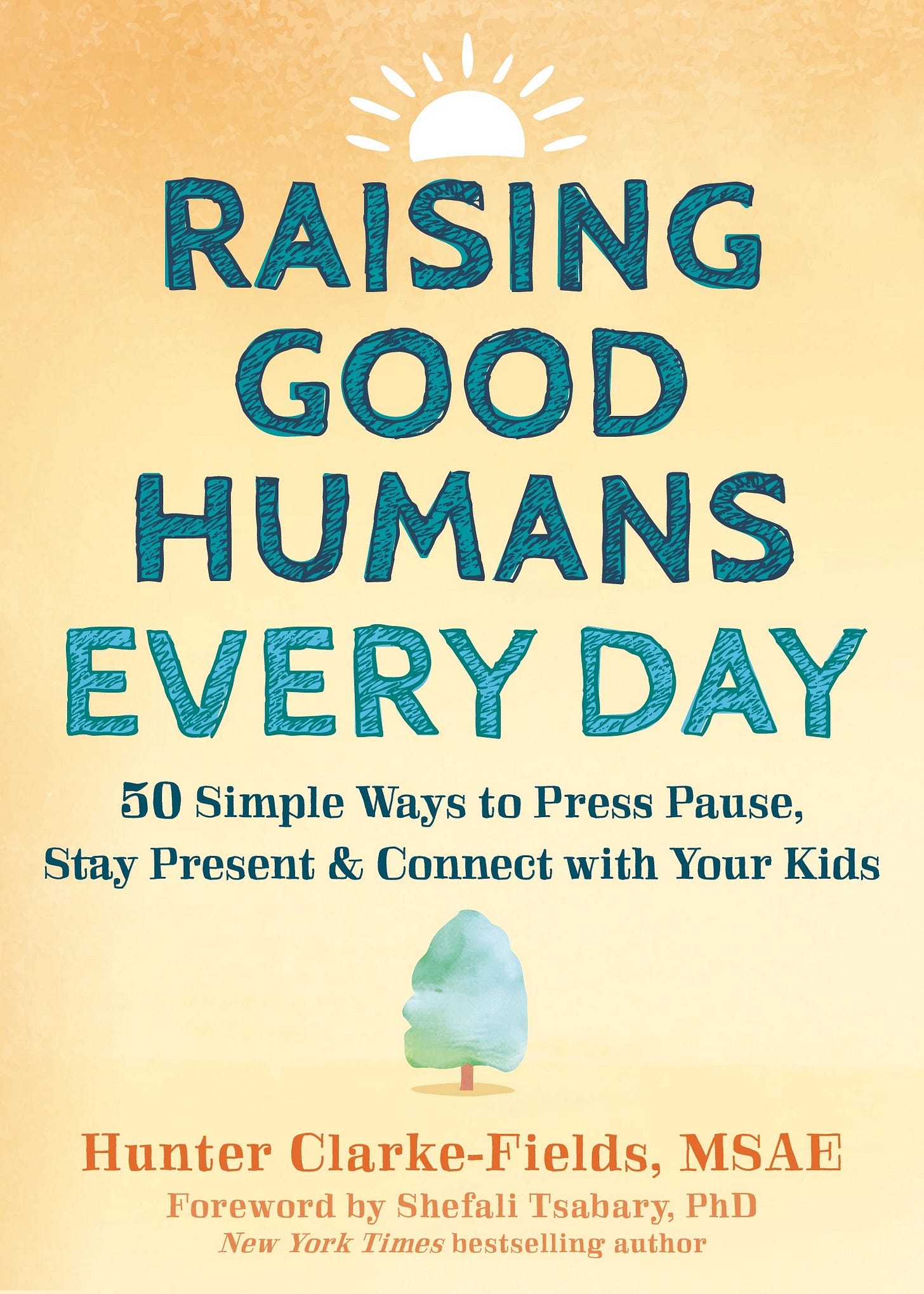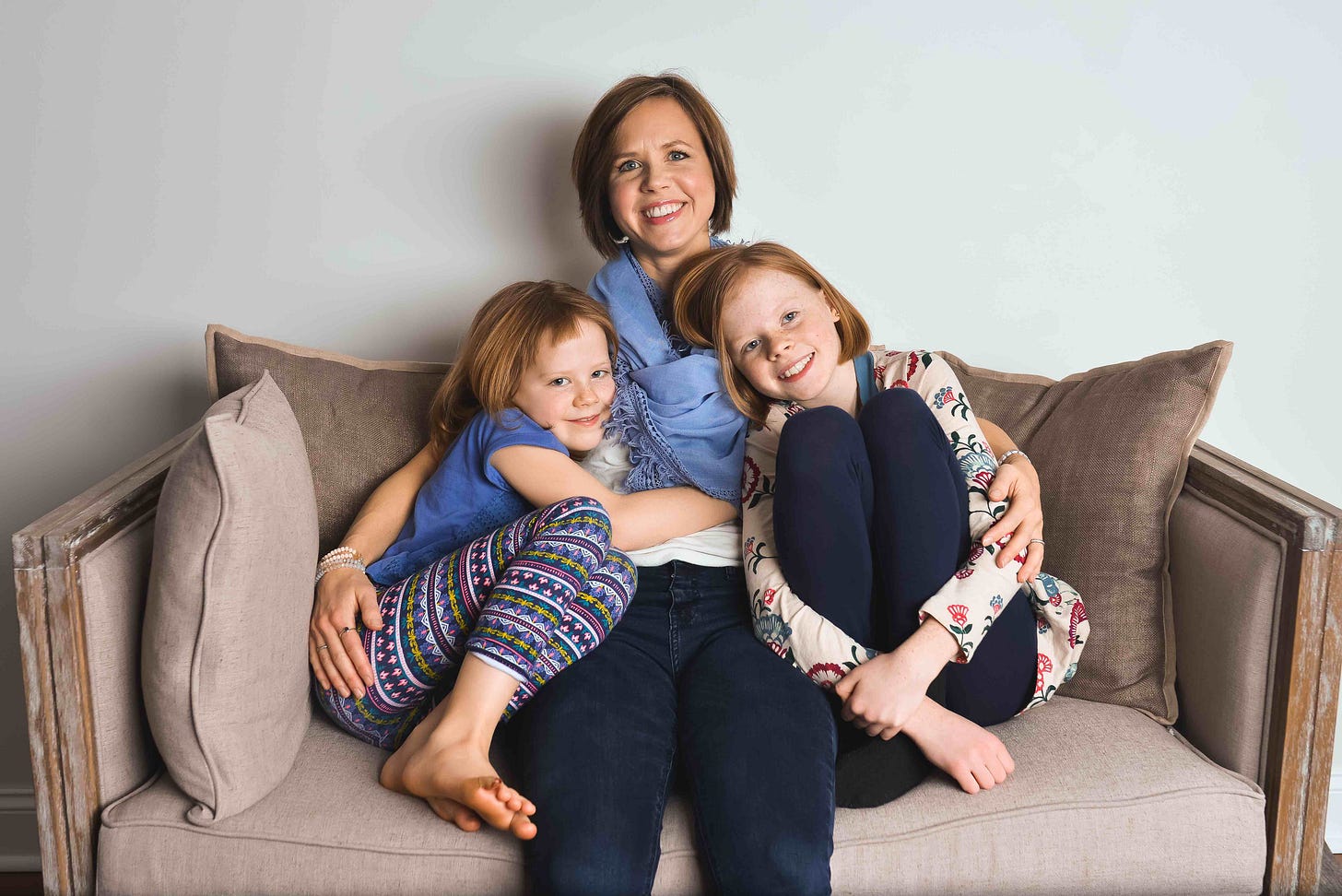While writing this feature interview, I couldn’t help but be reminded of my 21-year old daughter Gwen who is now living in Chicago.
..…the early morning wake up cries when she was an infant
………..leaving to work at the local community college with infant formula all over the lapel of my suit jacket
………………..reading her to sleep at night (“The Story of Ferdinand” was her favorite book
…………….…………..teaching her how to ride a bike
How time passes, arguably the greatest period in my life.
Daddy and Gwen
Today is National Family Day and with that I’d like to celebrate a recently released book entitled “Raising Good Humans Every Day – 50 Simple Ways to Press Pause, Stay Present and Connect with Your Kids” (New Harbinger Publications Inc.) by Mindful Mama Mentor Hunter Clarke-Fields
A guide to helping parents raise kind, confident and conscientious kids, this new book is a “go-to” daily resource for busy moms, dads, grandparents, uncles, aunts and caregivers who are seeking to stay mindful, be present and raise good humans – every day!
As a parent, it's the little things that you do each and every day that help your kids become compassionate, confident, and conscientious as human beings. But the grind can be wearing at times, amid the rush of getting them off to school, helping them complete homework, planning meals, and making sure that they get in bed on time so that they’re not grumpy-grumpsters in the morning.
I know all too well as a parent that sometimes this can get the best of you, literally snatching away the fun out of being a parent. This is where the book by Clarke-Fields comes in as a guide that offers quick, effective tools to stay present and manage emotions—both your child’s and your own!
This “go-to” daily guide offers 50 simple ways to press pause, stop reacting, and start parenting with intention. You’ll also find mindfulness skills for calming your own stress when difficult emotions arise along with strategies for fostering respectful communication, effective conflict resolution, and reflective listening.
Most importantly, through these daily tools, you’ll discover how to break unhelpful patterns and behaviors that you may have picked up from your own parents and upbringing, so that you can respond in a more thoughtful manner.
As a busy mom of two active daughters along with over 20 years of experience in meditation and yoga practices, Hunter Clarke-Fields book offers some invaluable tools including:
Self-compassion practices for those days when you feel like a “terrible parent”
Breathing and meditation exercises for calming emotions in the moment
Tips for “unhooking” from negative thoughts and self-criticism
Mindfulness skills for staying present with your kids
The book also offers perspective on how to develop a “teaching mindset” when faced with difficult behaviors as well as tons of creative and playful activities to increase cooperation in your child.
Says Hunter Clarke-Fields emphasizes, “Being a parent is a lot of work, but it can also be joyful and fun. Let this daily guide help you enjoy those little moments - they mean so much!”
What led you to write 2 parenting books about mindful parenting?
I struggled with my temper, anxiety and frustration as a parent at first. I now practice compassion, loving speech and deep listening with my two daughters. By shifting my communication style with my children, it positively impacted my life, relationships and daughters’ lives:
In your new book, you cover 50 daily tips to "press pause, stop reacting, and start parenting with intention". Can you give us an example of one of the most important tips in this book and how have you seen it make a difference for a parent/child relationship?
To slow down and do less. Kids are feeling the stress and pressure from too busy lives. We don’t have to entertain our kids or constantly drive to activities. They need time for free, unstructured play. So I invite parents to plan down time into their weeks. Life is precious, and kids grow quickly. If we are doing too much, we won’t be fully present to experience it, and our kids will lose the space and time to be a kid.
What are 3 examples of little things that you recommend parents do every day to help their kids grow up to be kind, confident, and conscientious human beings?
Take time to stop, breathe, and rest, at least for a minute, to get out of doing mode and into being mode. So they can be present for their kids.
Put away all phones and screens, and give their kids 5-10 minutes of undivided attention, listening with curiosity and following their kid’s lead to play and connect each day.
Invite their children into everyday tasks with them, like cooking and cleaning.
What are the top 3 ways that a parent can show more compassion for a child?
Remember that kid’s brains aren’t fully developed and that they need your help to co-regulate their feelings and calm down.
Remember that many behaviors we see as “bad” are a result of kids’ fight-flight-or-freeze nervous system reactions.
Get curious rather than judgmental. Don’t assume your child is manipulating you (they aren’t). Wonder why your child is acting the way they are.
What do you think is the most important parenting skill that you teach in your new book, Raising Good Humans Every Day?
How to calm down your reactivity, because when we’re losing it, we don’t have access to the problem-solving, verbal ability, impulse control part of our brain. If we don’t calm down our reactivity, we’re working with impaired parenting.
As a Mindful Mama Mentor, what is an example of an actionable item that parents can do to help their children be more confident?
Stop trying to solve all your kids' problems. When kids come to us upset about something, we want to make the difficult feelings go away, so we regularly offer solutions. However, when we do this consistently over time, it’s like a no-confidence vote on your child’s competency.
As a parent and mentor, what are 3 ways to build Calm and Cooperative Relationships with your children?
1. Listen to your child. Whenever you can, give them your undivided attention for their ideas and stories. When you can do this for your child when they are four, they will talk to you when they are fourteen.
2. Put away all phones and screens, and give their kids 5-10 minutes of undivided attention, listening with curiosity and following their kid’s lead to play and connect each day.
3. Prioritize your own self-care. Taking care of yourself is not selfish, it’s the foundation for mindful parenting. With regular care of your body-mind-spirit, you can not only model healthy living, but you will also be a more steady, grounded presence for your child.
Based on your experience, what do you think is one of the most unhelpful parenting habits? And how do you recommend breaking that habit?
Always putting your children first to the detriment of your health and happiness. When parents self-sacrifice, they teach their kids to self-sacrifice, modeling unworthiness for their children. Then parents are depleted and burnt-out, and are not able to show up for their children with any kind of steadiness. I recommend breaking the habit bit by bit. Identify what you need most—is it sleep, exercise, time with friends? Talk with your family about your needs and carve out time.
What is an example of a quick and effective tool for parents in your new book that can help you stay present and manage emotions—both your child’s and your own (versus getting caught up in your daily routine of driving them to school, doing homework, etc.)?
I really like the “tactical breathing” tool from the Navy Seals (Chapter 1, page 8). They recognize that they do not make effective decisions when they’re dysregulated, so calming down their stress response is a big priority. It’s a super-simple way to slow down the heart rate and become more regulated: Breathe in through the nostrils for a count of four. Breathe out through the nostrils for a count of four. Repeat four to six times.
What do you think is the best way to find balance and self-care as a mom/parent - so you are happy and you raise a happy and confident child?
It’s debatable if balance is even achievable. I encourage every parent to practice self-compassion. The truth is that we can’t do this job perfectly. It’s hard and we’re going to mess up. In those moments, we need a practice that reminds us of the fact that literally everyone makes mistakes, and that we can be kind to ourselves through our own challenges. When we practice this, we’re able to bounce back from difficult situations faster and get back in the arena.








-- Beautiful. Xo.